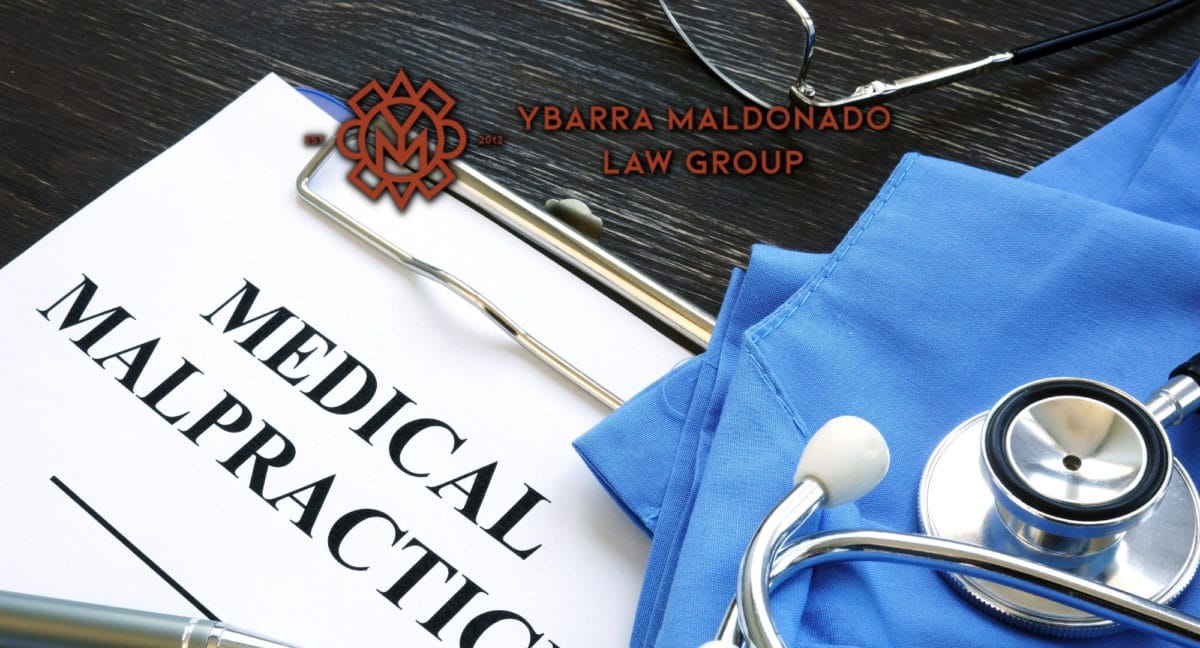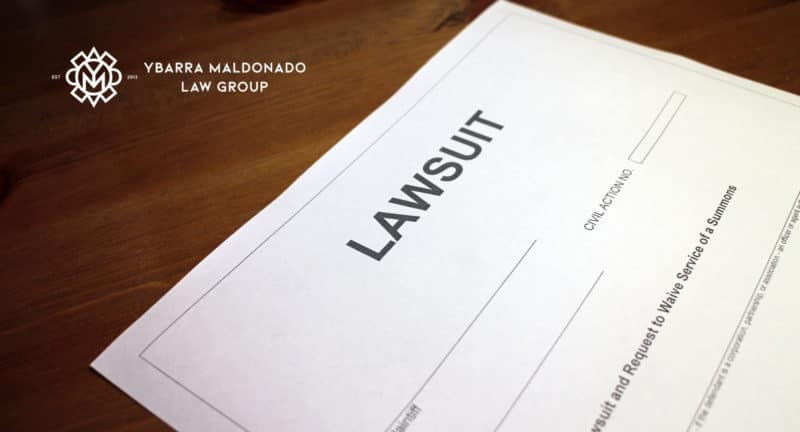PHOENIX MEDICAL MALPRACTICE LAWYER
PRACTICE AREAS
DON’T HESITATE TO REACH OUT TO US!
Our Law Firm is committed to becoming the best Law Firm for Latino, migrant, and Spanish speaking communities in Arizona.

The importance of the healthcare industry cannot be overstated. Especially after living through a global pandemic, many people have an increased appreciation for the work that doctors and nurses do. However, they are not infallible individuals. They are human, which means they are just as capable of making mistakes as non-healthcare professionals. Unfortunately, the mistakes made by clinic or hospital staff can be life-threatening, or even fatal. If you suffered injuries or illness from medical malpractice, you need a Phoenix medical malpractice lawyer with our firm.
At Ybarra Maldonado Law Group, our Phoenix medical malpractice attorneys have extensive experience holding medical professionals accountable for their actions. When a doctor tries to cut corners, save time, save money, or simply engage in negligence, they should be held accountable. Our Phoenix personal injury attorneys are here to help you with your personal injury claims. To schedule a case evaluation with us, please call 602-910-4040 today.
Holding Medical Professionals Accountable for Their Negligence
Health care professionals are an essential part of our lives. They administer shots, vaccines, and proper treatment for our illnesses. However, they also have a duty to ensure that they use their knowledge and expertise to make the right decisions. When negligence gets in the way of this, it could lead to medical malpractice lawsuits. If you fear that medical negligence was the cause of your illness or injury, you may have a case. Contact an experienced medical malpractice attorney with our law firm for a confidential case evaluation.
What Is Medical Malpractice?

Medical malpractice and medical negligence are two terms that are used interchangeably. When health care providers fail to uphold the expected standard of care, and that failure results in damages to a patient, this is medical malpractice. Medical negligence is negligence that is exhibited by doctors or other health care professionals.
This can occur by either commission or omission. Commission involves actually doing something that causes injury to the patient. Omission involves failing to do something that they should have done, such as ordering tests or offering medical treatment. Either way, if you and your lawyer can prove medical malpractice occurred, you likely have a strong case. Patients or their family members can then pursue compensation for that malpractice.
Examples of Medical Malpractice
Because of the number of tests, treatments, procedures, and surgeries that exist, there are many opportunities for medical malpractice to occur. Below, we list a few broad examples of medical malpractice claims we have seen in the past.
- Misdiagnosis
- Failure to diagnose
- Unnecessary surgery, procedure, or medication
- Performing surgery on the wrong site
- Improper medication
- Improper medication dosage
- Failure to order tests
- Not taking a patient’s medical history
- Misreading or ignoring lab results
- Surgical errors
- Premature discharge of the patient
- Failing to follow up or provide aftercare
- Failure to recognize symptoms
Arizona Medical Malpractice Law
Because state laws vary so greatly on so many subjects, it’s important to hire a personal injury attorney who is deeply familiar with Arizona law. In many states, medical malpractice cases are notorious for their complexity. That’s why it’s so important to work with an experienced Phoenix medical malpractice attorney.
According to ARS 12-542(1), the statute of limitations for filing medical malpractice claims is two years after the injury occurs. However, the “discovery rule” also plays an important role. This rule means that the statute of limitations clock starts counting down when the plaintiff knows or should have known that the injury resulted from medical negligence. We will cover other aspects of the legal process for these cases in the following sections.
What Should I Do if I Suspect Medical Malpractice?

As soon as you suspect that your injury or illness resulted from malpractice, you should take the following steps. These steps will help your case if it reaches litigation in an Arizona court.
- Prioritize your health. Find another doctor to ensure that the medical error does not worsen with time. The medical provider will want to review your records and perform diagnostic tests. Then, the doctor will uphold his or her duty to treat you appropriately.
- Request your medical records. Request copies of these records before you ever file a claim. The records will help to show when the medical malpractice occurs during your initial treatment or diagnosis.
- Keep a detailed journal. As soon as you recognize a problem, start keeping a journal about your health and symptoms. Describe, in as much detail as possible, your symptoms and how those symptoms have impacted your life. Try to do this every day so that your attorney can seek fair compensation for your suffering.
- Refrain from speaking with others about the case. As much as you can, refrain from discussing your case with anyone outside your legal team. Specifically, do not speak with any medical providers involved or post about the incident on social media. This could hurt your case.
- Contact an attorney. It is not recommended to represent yourself in such a complicated case. Schedule a case evaluation with legal representation as soon as possible to find out whether you have a viable case. If you do, you should follow your attorney’s advice closely.
When to File a Medical Malpractice Lawsuit
The sooner you can get your medical malpractice case rolling, the better. The longer you wait to file any kind of personal injury claim, the less likely your suit will be. Working with good personal injury attorneys can help you handle your case swiftly and efficiently. The defendant in your case would likely try to question why you delayed in filing a lawsuit if you waited too long.
Common Types of Medical Malpractice Cases
As we mentioned before, there are many ways in which a medical professional can exhibit negligence in their treatment of a patient. Certain types of medical and hospital malpractice are more common than others, however. Below, we outline some of the most prevalent medical malpractice cases.
Delay in Diagnosis or Misdiagnosis
Approximately ⅓ of all medical malpractice cases are related to either a missed or delayed diagnosis. That’s a significant percentage of the approximately 20,000 cases filed each year in the United States. Delayed or incorrect diagnoses can cause a number of problems for patients, including the following.
- Not receiving the proper treatment or medical procedure in time
- Receiving the wrong treatments
- Worsening illnesses
- Wrongful Death
Failure to Obtain Informed Consent
Informed consent is a crucial part of the healthcare system, as well as ethics. It basically means that patients have a right to know details about their treatment and be given the chance to ask questions. This allows them to make well-informed decisions about their care. When doctors fail to ensure that they uphold the principle of informed consent, they risk treating a dangerously uninformed patient.
Birth Injuries
Birth injuries are those injuries that occur to either a mother or newborn baby during the birthing process. Many types of these injuries exist, and they have the potential to produce lifelong complications. Examples of birth injuries include the following.
- Cerebral palsy
- Erb’s palsy
- Brachial palsy
- Forcep injuries
- Caput succedaneum
- Cephalohematoma
- Uterine rupture
- Umbilical cord prolapse
Anesthesia Complications
Complications related to anesthesia are particularly dangerous. Older adults are particularly vulnerable to the effects and complications related to anesthesia. That’s why they must be informed about the risks and why doctors must take special care with the procedure. Older adults face the following anesthesia-related risks.
- Pneumonia
- Postoperative confusion
- Stroke
- Heart attack
Medication Errors
A medication error is a preventable event which could lead to the inappropriate use of medications or harm to the patient. They often result from other medical errors, such as delayed diagnosis, incorrect diagnosis, or failure to obtain informed consent.
Surgical Errors
These occur while a doctor is performing surgery on a patient. They can range from unnecessary procedures, such as an unnecessary hysterectomy, to retained surgical instruments. Retained surgical instruments are those which are accidentally left inside the patient’s body by the surgeon.
Wrongful Death
The most serious potential consequence of medical malpractice is wrongful death. In the case of an egregious or unfortunate error, patients could suffer fatal harm or illness. If this happens, you should speak with a qualified wrongful death attorney.
How Do I File a Medical Malpractice Claim?

Before we recommend how to file a claim, it’s important to understand one thing. Not every medical malpractice or wrongful death case is the same. They each have their own nuances and specifics that should be addressed. In order to ensure that you make the best possible decisions for your case, it’s important to speak with an attorney as soon as possible. After that, we recommend the following steps.
- Contact the medical professional involved with your case. If the problem is minor, they may be able to remedy the situation without the need for litigation.
- Work with your attorney to contact the medical licensing board.
- Get a second opinion from a different practitioner to confirm your diagnosis.
- If you receive a fair offer, consider settling instead of going to court. However, do not settle for a lowball offer. Always consult with your attorney before accepting a settlement offer.
Requirements to File a Medical Malpractice Claim
Before you can ever file a claim, you should schedule a free case evaluation with an experienced attorney. They can help you determine whether your case has merit before you’re tied up in legal proceedings. You and your attorney must prove the following four elements. We will discuss these in more detail later on.
- There was a doctor-patient relationship between the patient and the defendant.
- The doctor had a professional duty of care owed to the patient.
- They breached that duty and exhibited negligence.
- This negligence led to actual damages that the patient suffered as a result.
Medical Malpractice Statute of Limitations Arizona
In Arizona, you have two years from the date you knew about or should have known about the injury or illness to file a claim. If you do not file within this time period, the court may dismiss your case altogether.
How to Prove Medical Malpractice

We mentioned before that you must prove certain elements in order to have a valid case against a medical professional. These elements are as follows.
Doctor-Patient Relationship
This relationship must have existed either by express agreement or by the patient knowingly receiving treatment from that doctor.
Breach of the Standard of Care
There was an expected standard of care for the doctor to uphold for that patient. This standard of care is determined by what another doctor in a similar situation in a similar field would have done under the same or similar circumstances.
The healthcare professional involved breached this standard of care. They deviated from the standard accepted within the medical community. This is a form of medical negligence.
The Doctor’s Negligence Caused Your Injury or Illness
That negligence directly caused your illness or injury. You can prove this with the help of testimony from medical experts as well as your medical records.
You Suffered Damages from the Negligence
The patient suffered actual damages from that negligence. This includes both economic and non-economic damages.
What Damages Can I Receive in My Medical Malpractice Case?

Patients who suffer due to medical or hospital malpractice deserve compensation for their losses. That’s why we prioritize the needs of the injured patient above all else. Below, we outline the damages you might recover if you are successful with your case.
Economic Damages
- Medical bills
- Physical therapy costs
- Medication costs
- Future medical expenses
- Burial and funeral costs
- Lost income and lost wages
Non-Economic Damages
- Pain and suffering
- Loss of earning capacity
- Mental and emotional anguish
- Loss of quality of life
- Loss of consortium
Does Arizona Have a Medical Malpractice Cap?

Victims might be pleased to hear that the Arizona Constitution expressly forbids a cap on medical malpractice damages. While many states do place a cap on these awards, Arizona does not. In fact, this applies to all other personal injury cases in the state. This means that victims who suffer serious injuries will not be limited to a pre-established cap or by insurance company policy limits.
Contact Our Phoenix Medical Malpractice Lawyers
At Ybarra Maldonado Law Group, we understand how upsetting it can be to realize that someone who you placed your trust in betrayed that trust. Doctors, nurses, and other medical professionals are expected to perform at a very high standard of care. When they fail to do this, the consequences be a catastrophic injury. If you seek legal advice from a personal injury law firm with experience handling these cases, we’re here for you. Contact the Phoenix, AZ medical malpractice lawyers with our law firm today. We will ensure that your serious injury or illness is treated with the utmost care. Call today at 602-910-4040 to schedule.

